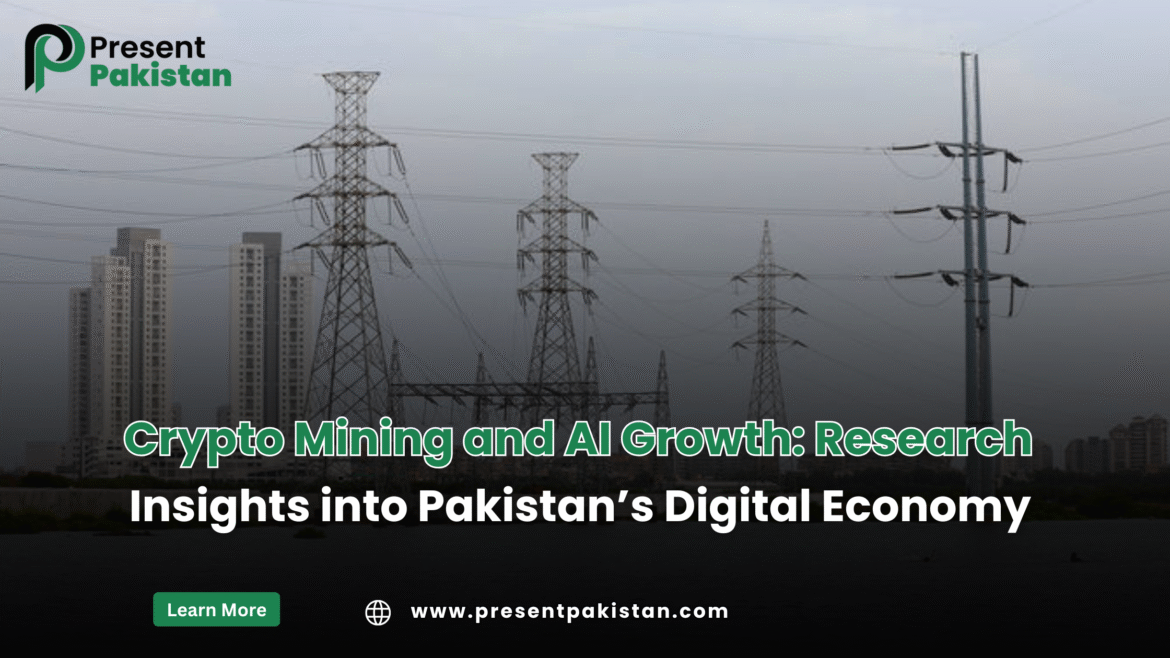Pakistan’s Digital Turning Point
Crypto Mining and AI Growth in Pakistan: Investigating Pakistan’s Digital Economy. Instead of a discussion about the future, it is now our present. Pakistan’s long history of energy shortages and financial crises are being propelled by the country’s capacity to use its excess electricity from the grid to back projects utilizing AI-powered data centers or cryptocurrency mining farms; Pakistan is putting itself on the map as a South Asian digital transformation country.
This development embodies two of the fastest-growing world markets: artificial intelligence and cryptocurrency. The implications of this combination are unique; they could enhance Pakistan’s digital economy, create jobs, attract foreign investment, and utilize surplus electricity. Like everything else, opportunities also come with risk; regulation, environmental impacts, and security risks are still going to be part of this ongoing dialogue.
Table of Contents
- Understanding the Link Between Crypto Mining and AI Growth
- Pakistan’s Digital Economy: Current Challenges and Opportunities
- Surplus Electricity and Its Role in Digital Transformation
- Government Policies and Industrial Strategy for AI & Crypto
- Crypto Mining in Pakistan: Risks, Rewards, and Global Comparisons
- AI Growth in Pakistan: Workforce, Education, and Infrastructure Needs
- Research Insights into Pakistan’s Digital Economy
- Crypto Mining and AI Growth in Pakistan
- People Also Ask
- FAQs
- Conclusion
- Crypto Mining and AI Growth in Pakistan
Understanding the Link Between Crypto Mining and AI Growth
On their face value, crypto mining and artificial intelligence are two completely different industries. However, both need computing power, algorithmic intelligence, and a chance to utilize an identified supply of energy. While crypto mining is used to validate transactions on the blockchain, sketching out a significant energy use case, training and optimizing AI models, like GPT-2, utilizes a massive amount of computing power when testing and validating cases.
In the case of Pakistan, with a surplus of electricity available to consumers during off-peak periods, it creates a unique dual opportunity as follows:
- Crypto mining farms can sell/monetize their unused power, with their surplus electricity an opportunity.
- AI data centers could use the excess power opportunity to train and power applications, as well as amplify all industries, from agriculture to health sciences.
Key Points:
- Both industries require high-performance computing to expand.
- The excess power availability, combined with lower rates, gives Pakistan a real chance to lead the next phase of digital expansion.
Pakistan’s Digital Economy: Current Challenges and Opportunities
Pakistan’s economy remains subject to a multitude of constraints, predominantly derogatory exports, high import levels, and recessionary inflation, but we are able to look more positively at the digital economy, which is an unappreciated, underheated opportunity. Currently, Pakistan is producing less than 1% of the global digital economy and is significantly behind neighboring competitors such as India.
However, with our strong labor forces being driven by youthful potential, the costs of smartphones and SIM cards on the decline, and the ease of internet connectivity and government social platforms, there is a lot of potential for developmental change. When controlled through processes of a vulnerable balancing act of AI technologies, and as we continue the development stages of integrating blockchain technologies, we could fulfill tremendous enhancements and improvements within the regions we occupy.
Key Points:
- Pakistan does have a digital economy, or at least a digital stage of development, and it could be much better.
- AI and crypto have the potential to significantly elevate GDP advances and influxes of foreign investment!

Surplus Electricity and Its Role in Digital Transformation
When demand is in the off-season, Pakistan generates excessive amounts of electricity. Historically, this surplus has been dumped without any planning or ineptifiers during transmission. The government is attempting to use an artificial intelligence (AI) and crypto-drive initiative to capitalize on excess electricity by channeling it into data-led industries.
This strategy presents a multiple Tier 1 impavement:
- Cryptocurrency mining turns electricity into Bitcoin, a real value, structure/artificial avatar.
- AI computing builds upon local research, innovation and industry depth value.
Key Points:
- Surplus electricity can create digital dollar revenue streams instead of going to waste.
- Pakistan can be a low-cost facility for all AI or blockchain processing.

Government Policies and Industrial Strategy for AI & Crypto
Pakistan’s paradigm shift came in April of 2025 with its announcement to direct 2,000 MW of surplus electricity to AI data centers and crypto mining services. This came with a new structural commitment to a systematic approach to AI industry strategy. AI is part of a new industrial policy orienting toward recognizing AI as a strategic industry.
Government support is just as valuable, including:
- Policy frameworks are developed to support AI uptake.
- Crypto is regulated as AI development via PVARA.
- Facilitating international collaborations and partnerships in investment and expertise development.
Key Points:
- Pakistan has now recognized operationally AI as a strategic industry.
- The amount of 2,000 MW (surplus) is a precedent.
Crypto Mining in Pakistan: Risks, Rewards, and Global Comparisons
The reality of crypto mining is that it isn’t risk-free. There are a number of relevant issues for Pakistan:
- Misuse of energy if there is a future increase in demand.
- Impact on the environment by mining farms.
- Uncertainty with the regulations as well as ever-increasing restrictions globally on crypto.
On the other hand, the benefits are enormous and wider ranging, such as:
- Generation of revenue from reserves of Bitcoin.
- Exportation of computing services to the global crypto and AI markets.
- Creation of jobs and employment for the young generation of IT professionals in Pakistan.
Through comparisons we see Kazakhstan, Iran and El Salvador have made strides in and use crypto mining. Although late to the race, Pakistan has potential.
Key Points:
- Crypto mining has risks of volatility and misuse.
- Pakistan can learn from other global models to help ensure sustainability.

AI Growth in Pakistan: Workforce, Education, and Infrastructure Needs
AI development is not just about power but also requires talent, infrastructure, and an education with a research basis. The research revealed the requirements of Pakistan would be:
- Develop curriculum for AI, Blockchain and data science.
- Develop HPC Labs.
Key Points:
- Success in AI will require workforce readiness.
- Education and infrastructure will be a prerequisite to development.

Research Insights into Pakistan’s Digital Economy
The research provides three main findings in
- AI is a strategic necessity versus a choice
- Crypto mining provides a way to monetize excess energy and establish new streams of income.
- Digital-only inclusive models present expansion options and buffering in economic surcharges.
Key Points:
- The research shows a clear policy direction for Pakistan.
Crypto Mining and AI Growth in Pakistan
Crypto mining and AI growth in Pakistan are not simply buzzwords but a national digital transformation strategy. The keyword itself refers to the intersection of technology and economy and energy optimization, making it a key part of Pakistan’s vision for 2030.
Key Points:
- The crypto mining and AI growth in Pakistan represent Pakistan’s growth engine moving forward.
- Research shows it is relevant, trending, and practical.
People Also Ask
Q1: Why is Pakistan investing in these emerging industries of crypto mining and AI?
Pakistan is investing in both of these industries because they help to monetize surplus electricity, bring investment to Pakistan, and build a future-proof digital economy. AI also drives productivity improvements in agriculture, healthcare and education, among other industries.
Q2: Is crypto mining profitable for Pakistan?
It can be profitable for Pakistan, but only if it is managed properly. The profits will depend on energy costs, market prices of Bitcoin, and sustainable practices. The excess supply of cheap electricity in Pakistan gives the country a unique advantage.
Q3: How does AI growth impact Pakistan’s youth?
AI creates new types of jobs in data science, robotics, and machine learning, allowing Pakistan’s youthful population to define and lead the cycle of innovation.
Q4: What are the risks of crypto adoption in Pakistan?
Energy theft, illegal trading, money laundering and stress on the environment are some of the risks that Pakistan faces. Moreover, since there are no regulations in place, it is more likely to have energy theft, illegal trading, money laundering and stress on the environment. Hence, laws are needed to build trust and participation in the economy.
FAQs
Q1: What is crypto mining and AI growth in Pakistan?
Crypto mining and AI growth in Pakistan represent the government-endorsed effort to utilize surplus electricity for blockchain validation and AI-driven computing to bolster the digital economy.
Q2: How much electricity is being allocated to crypto and AI projects?
The government is allocating 2,000 MW of surplus electricity to the initial phase of the initiative.
Q3: Can crypto mining address Pakistan’s economic crisis?
No, not completely, but it can provide alternative income, attract foreign direct investment and create jobs to relieve the burden of an uncertain economy.
Q4: Is AI part of the industrial policy of Pakistan?
Yes, in Pakistan’s 2025 shift in industrial policy, AI was formally defined as a strategic industry.
Q5: How does this help regular citizens?
By providing job opportunities, filling training gaps in digital skills, reducing energy wastage and helping Pakistan through periods of uncertainty.
Conclusion
Research into Pakistan’s Emerging Digital Economy: Crypto Mining and the Advent of AI Technologies presents an important pathway to allow this nation to function as the digital economy. Through even better optimizing unused energy to mine, investing in underlying infrastructure to facilitate AI tools, and also utilizing blockchain technology, there can be opportunities for Pakistan to compete more effectively globally in the digital economy.
However, these actions are dependent on enabling regulations, trust among parties, educational growth opportunities, and environmental sustainability. If these policies are enacted, Pakistan can turn some of its ongoing challenges into future opportunities and develop into a knowledge-based economy befitting the 21st century.
Stay Ahead with Present Pakistan
To learn about the latest developments in AI, crypto mining and digital transformation taking place in Pakistan, visit Present Pakistan for insights, stories, news, and commentary that put you ahead of the game.







